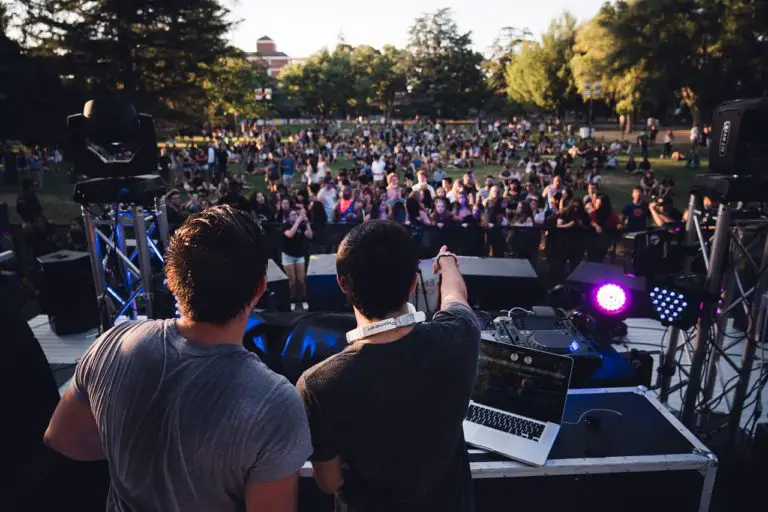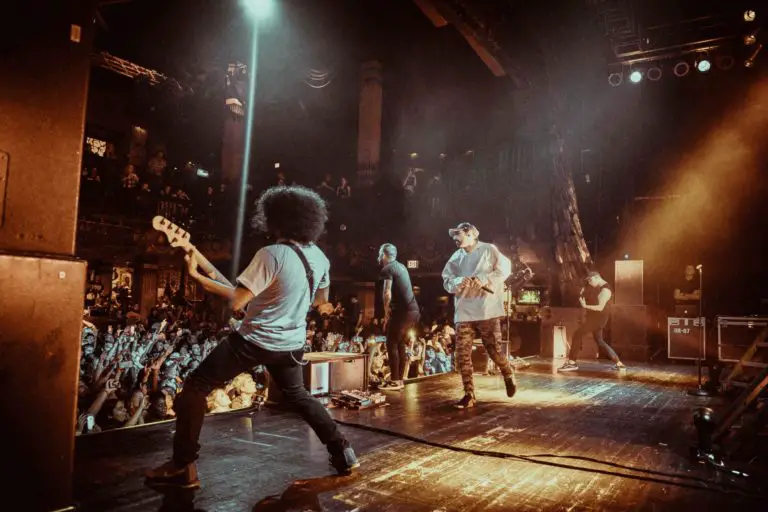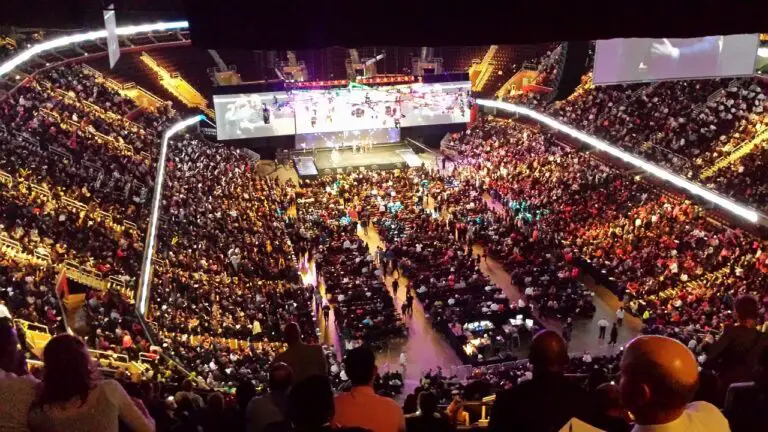Are Virtual Concerts Worth It?
With the onset of the infamous COVID-19 in 2020, concert ticket sales plummeted. Every form of social gathering quickly became a health hazard, and social distancing policies came into law.
Schools, airports, and movie theaters were closed. Concerts were canceled and postponed. People had to stay at home. The world had to adapt to these changes by turning things virtual.
Schools switched to online instruction, people used Zoom to stay connected with their coworkers, and streaming platforms replaced movie theaters.
And, of course, live music went virtual too.
With the virtual way of life sticking around for a while, in-person concerts remain scarce. So, are virtual concerts worth it? Only you can decide if virtual concerts are worth it for you. Many people find that seeing their favorite musicians in person while surrounded by fellow fans is the entire point. However, other types of fans will find many compelling reasons to embrace this new tech.
The Argument for Virtual Concerts (Pros)
Virtual concerts would not have become a thing if they didn’t offer some benefits. Shelter-in-place orders have forced new solutions to the old ways of doing things. Much of this appears to be here to stay.
You Do Not Need To Travel To See Your Favorite Musician
Not everyone is fortunate enough to live in a highly recognized city. The truth is that your favorite music artists are only able to go where the demand is highest. If you live in a town or suburbs, you’ll need to request time off of work to give you time to travel.
Alas, no musician can be everywhere at once. Virtual concerts changed this reality.
Virtual concerts equalize the opportunity for fans to see their favorite performers live regardless of where they live. With the burden of travel (gas and flight expenses, time off work) eliminated, people in Nowhere, Oklahoma, are just as able to see a concert as their fellow fans in Chicago, Illinois.
Yes, Nowhere, Oklahoma is an actual location.
It’s also far safer to stay at home than risk a car accident. In-person concerts attract copious amounts of congestion and drunk drivers to the tiny areas around stadiums.
Additionally, you get to stay home! You have easy access to your kitchen and couch whenever you please. You can get comfortable, crank the air conditioning, cozy up in a blanket, or whatever else suits the mood.
Hungry? No expensive concessions here. Just head to the kitchen to whip up a meal or grab a snack. Maybe get a beer or two while you’re up.
Everyone Gets A “Front Row Seat”
A significant disadvantage of in-person concerts is quite clear — the view is rarely clear. With thousands of people scrambling to be as close to famous musicians as they can, you have to be supremely lucky or wealthy to get a front-row view.
Fortunately, virtual concerts allow everyone to observe performances from the same on-stage cameras. You’ll be able to enjoy breathtaking cinematography with audio quality limited only by the best headphones you can afford. The only person standing in front of you is someone you paid to see.

Virtual Events Are Cheaper Than An Actual Concert
Concerts are very much a luxury good. The cost of an average in-person ticket has soared to a groan-inducing $94.83.
Ticket prices continue to rise. Why? A combination of increased touring expenses and ceaseless demand raises the price.
But most significantly, artists are charging more to counteract the lost album sales brought by streaming services. It’s safe to say that virtual concerts are the internet’s solution to an Internet-created issue.
Livestreaming service LiveXLive Media reports an average price of 27 dollars for virtual tickets on their platform. This is excellent news for fans on a budget who may not otherwise be able to attend live shows. Since it looks like virtual concerts are sticking around, it means that more people will get to experience live music than ever before.
The Argument Against Virtual Concerts (Cons)
While virtual concerts are more accessible, affordable, and safer than in-person concerts, some notable drawbacks, depending on your preferences, could either be slight annoyances or total deal-breakers.
No Music Fans Means A Less Energetic Atmosphere
Like the coronavirus, energy is highly contagious. When high numbers of amped-up fans are in one place, enthusiasm multiplies with each person.
While that’s not a mathematical fact, being near others indeed amplifies emotional response. It’s hard to replicate the euphoria of being in the same place as the artists.
Music artists do their best to allow fans to excite each other up by opening live streams early. Although we shouldn’t understate the significance of the connections people make through chat features, most human communication (like body language) is lost. The truth is, typing “Woohoo!” in the chat isn’t the same as shouting it.
Less Satisfaction from Not Being At A Music Festival
In the same way that some people prefer printed books to ebooks, vinyl to digital, and fountain pens to ballpoints, there are several instances when new does not mean best.
Understandably, people are likely to feel the same way about concerts being phased out by something “better.” Like with eBooks, the reasoning against technology isn’t always logically sound: “I like the smell of paper,” “books feel nice.” Nevertheless, such sentiments aren’t invalid.
In-person concerts are authentic concerts. Many people devote their lives to seeing their favorite bands perform while traveling the world.
These experiences provide great satisfaction for millions of people, who can tell their friends and family about how they saw their favorite musician in person. They can say things like “I was there” and “I was within twenty feet of them.”
Virtual concerts don’t offer this kind of pride. In many ways, even the most elaborate virtual shows aren’t much more than live music videos.
Musicians May Suffer Yet Another Loss
You might not be too concerned about The Rolling Stones and Taylor Swift taking a financial hit. But the music industry works as a unit. When Napster came around and wealthy artists like Dr. Dre and Metallica filed lawsuits, it was the beginning of a massive downward spiral for all musicians.
Streaming replaced album purchases, and consumers gained access to millions of songs for only a small monthly fee. Small artists who could once make decent money selling albums lost their livelihood.
Some musicians adapted to the change by being more proactive in getting paid gigs. They sacrificed their security for a life on the road, and many did quite well.
Still, virtual concerts may reduce the demand for in-person performances for these small artists, hurting yet another money-making outlet for them. Musicians with local fame might struggle to stand out on the internet.
This isn’t to say there’s no hope — artists are already figuring out how to generate revenue through Patreon donations and live stream tipping. But it appears that musicians may need to overcome another hurdle.
Conclusion – Are Virtual Concert Experiences Worth It?
Travel restrictions and shelter-in-place orders put a halt to traditional concerts for a while. Consequently, bands and music artists have adapted to a new reality by hosting virtual shows.
Thanks to the magic of livestreaming, fans realized they could see their favorite artists without the hassle of traveling and getting a decent view. Now that COVID-19 cases are on the decline and life resumes are standard, many fans don’t want to go back to in-person concerts.
Nevertheless, in-person concerts remain in demand because of the irreplaceable experiences and bragging rights they offer; and paying more for an actual show is the best way to support the music you love.
Are virtual concerts worth it? Only you can decide.
Related Questions
How do you enjoy a virtual concert?
If you truly want to immerse yourself in a virtual concert, there are steps you should take to amplify your enjoyment.
First things first: turn off the lights! Concerts usually happen at night or in a dark room to shut off everything outside the band and audience. Being in a dark room also veils potential distractions in darkness, allowing you to focus on the screen.
Secondly, use the best viewing and audio equipment you can get your hands on. We’re not saying to wipe out your checking account by buying a 70 inch, 8k display — but a 13-inch laptop display and onboard speakers can be an underwhelming setup. Connecting via HDMI to a larger display lets you see more, while some decent headphones (which you should already have if you’re serious about music) make the experience more surreal.
Finally, even though you’ll likely be joining a chatroom with thousands of fans, watch it with some friends if you can! They’ll allow you to sing along with others like you would in a traditional concert.
How does a virtual concert work?
The coronavirus pandemic caused their recent explosion in popularity, but the underlying technology of virtual concerts has been around a little while. 360-degree cameras allow fans to enjoy VR concerts. Several high-quality microphones allow fantastic audio. A solid internet connection minimizes lag time so what you’re seeing is indeed live.
None of these things are new, but their implementation is undoubtedly innovative. It takes a team of professionals with a sizeable budget to make the perfect virtual concert possible. And, of course, we need streaming services to deliver all of that hard work for music enthusiasts to enjoy.










